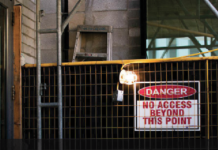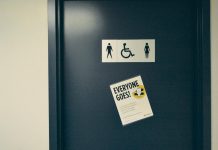Two new gender-neutral bathrooms opened on March 31, International Trans Day of Visibility, with more to open this week. Both Glow and the EDI-R (Office of Equity, Diversity, Inclusion, and Anti-racism) worked to bring the project to fruition.
“It makes me so happy knowing there’s so many other kids that will have access to this,” said Sam Jones, former trans equity director for Glow. A date for the ribbon-cutting ceremony has not been set yet.
According to the proposal for gender-neutral washrooms, which cited a 2019 survey by the American College Health Association, at least 2.9 per cent of UW students are trans.
Wren Alden, former executive assistant for the WUSA VP education portfolio, explained the process for installing the gender-neutral washrooms. In fall 2021, Glow raised concerns regarding a “washroom desert,” a term referring to the fact that many students would be unable to access a gender-neutral washroom in the 10 minutes between classes.
Alden described Glow’s efforts to survey several hundreds of washrooms on campus, reviewing them in person as well as on floor plans to check the viability of converting them into gender-neutral washrooms.
Alden emphasized Glow’s approach to make the greatest material change with the least physical change. Due to a “miscommunication,” the PVP (a group of the president’s direct reports including the vice president) believed Glow’s project and a similar project by the EDI-R to be the same, which caused Glow’s work to be put on hold until the misunderstanding was resolved.
The proposal for the washrooms, sent in the spring of 2022, stated that the project was “intentionally limited in scope,” due to the fact that any changes beyond changing signage and implementing bins for menstrual waste would activate Ontario Building Code requirements to retrofit old construction up to current codes.
Jones attributed further delays on the opening date to supply chain issues and new hires coming around the time of the opening, and added that poor communication only made the situation more frustrating. “Glow ended up writing a letter to the equity office and whoever else was in charge of logistics basically saying that this is unacceptable. You can’t just say it’s not happening and not give us a date,” they said.
Feedback forms for potential locations were posted in November 2022. Alden emphasized the importance of the feedback received regarding potential candidates. “As we were going through this process, we were checking … is this a washroom that’s used for religious reasons, is this a washroom in a building where there’s one women’s washroom for five men’s washrooms?”
Students appreciated the balance Glow sought to maintain. “Some people may be uncomfortable with using gender-neutral washrooms so I like that there’s options,” said Jennifer Wang, a third-year ECE student.
Alden pointed out the lack of action when trans people face danger in gender-specific washrooms, as opposed to the action taken due to perceived dangers posed by trans people.
“We’ve noticed perceptions that sexual violence and related assault, harassment, etc. … kind of gets trumped up as something which is going to happen [to trans people] … whereas when … white women are the victims of the same issue, that is seen as something that’s more actionable and more necessary to intervene upon,” Alden said.
In reflecting on the project as a whole, Alden said they want UW to facilitate advocacy work better, particularly student advocacy work.
“The question is … how are we going to support, (especially student), advocacy projects going forward? How are we going to perhaps ensure that people have a community of people to go to to say, ‘I’ve noticed a problem, and I’ve had some ideas for a solution, who can I work with?’” Alden said.
Rania Atif, a fourth-year arts and business student who sits on WUSA’s board of directors, expressed concern with the execution of the initiative. Atif said that it was important to create inclusive spaces “especially because we are moving into a time where gender identity is something that we really do have to fight for,” but noted the consequence of taking planned resources away from other, already-planned initiatives.
“The way that they sort of executed it was essentially bullying [the] board into fitting it into their annual plan … I think that it was definitely something that does affect students and that should be introduced,” Atif said. “But … there’s a way to follow things because unfortunately, bureaucracy … means that we have to compromise on things. And so … we have to unfortunately pick and choose our battles.”
Jones hopes the bathrooms set a positive precedent for future advocacy work. “I’m really hoping this will be received well enough that it encourages the president especially to push these issues … I think Waterloo deserves to be known for more than [being a STEM school] because even if we’re not at the point where a lot of queer people are getting into STEM yet just because of educational barriers, we’re at least breaking it down a little bit so [it’s] not another thing that’s keeping them back.”































